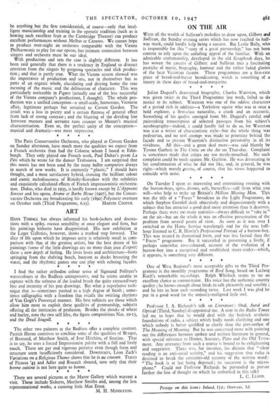ON THE AIR
Wrrx all the wealth of Sullivan's melodies to draw upon, Gilbert and Sullivan, the Sunday evening series which has now reached its half- way mark, could hardly help being a success. But Leslie Baily, who is responsible for this "story of a great partnership," has not been content to rely upon the unfailing appeal of the familiar. With an admirable craftsmanship, developed in the old Scrapbook days, he has woven the careers of Gilbert and Sullivan into a fascinating pastiche of music, biography, humour and the rather faded glories of the later Victorian theatre. These programmes are a first-rate piece of bread-and-butter broadcasting, which is something of a luxury in these days of bread-and-margarine.
Julian Duguid's dramatised biography, Charles Waterton which was given twice in the Third Programme last week, failed to do justice to its subject. Waterton was one of the oddest characters of a period rich in oddities—a Yorkshire squire who was at once a bold explorer, a first-class naturalist, a crank and an eccentric. Something of his quality emerged from Mr. Duguid's careful and painstaking transcription of selected passages from his subject's autobiography—indeed, it could hardly fail to do so, for Waterton was also a writer of characteristic style—but the whole thing was pedestrian, and no real attempt was made to penetrate behind the façade and to present Waterton's distinctive personality in all its vividness. All this—and a great deal more—was said bluntly by Tyrone Guthrie in The Critic on the Air on Thursday. Complaint is sometimes made that critics are too mealy-mouthed. No such complaint could be made against Mr. Guthrie. He was devastating in his condemnation of what he did not like, and, in general, he was right—which merely ,means, of course, that his views happened to coincide with mine.
* * *
On Tuesday I spent an interesting and entertaining evening with the barrow-boys, spivs. drones, eels, butterflies—call them what you will—who help to make up Britain's Million Missing Men. This was the title of a "Focus" broadcast in the Light Programme, in which Stephen Grenfell dealt objectively and dispassionately with a subject that has attracted a good deal more attention than it deserves. Perhaps there were too many statistics—always difficult to "take in" on the air—but on the whole it was an effective presentation of the problem from several points of view. As soon as it was over I switched to the Home Service wavelength and for the next half- hour listened to C. R. Hewitt's Professional Portrait of a barrow-boy. This was treated in dramatised form, and was less factual than the " Focus " programme. But it succeeded in presenting a lively, if perhaps somewhat rose-coloured, account of the evolution of a barrow-boy into a recognised and established street-trader—which, it appears, is something very different.
*
One of West Regional's most acceptable gifts to the Third Pro- gramme is the monthly programme of Bird Song, based on Ludwig Koch's remarkable recordings. Ralph Whitlock seems to -rie an excellent choice as commentator. His voice has the authentic country quality' he knows enough about birds to talk pleasantly and sensibly ; and he lets us hear each recording twice. Last week I was glad he put in a good word for the unjustly-maligned little owl.
• * * *
Professor I. A. Richards's talk on Literature : Oral, Aural and Optical (Third, Sunday) disappointed me. A note in the Radio Times led me to hope that he would deal with the bedrock aesthetic foundations of radio, a subject which badly needs clarifying and one which nobody is better qualified to clarify than the part-author of The Meaning of Meaning. But he was concerned more with pointing out the differences between spoken and written literature in general, with special reference to Homer, Socrates, Plato and the Old Testa, ment. Any utterance from such a source is bound to be enlightening and suggestive. There was, for instance, his dictum that "silent reading is an anti-social activity," and his suggestion that radio is destined to break the centuries-old tyranny of the written word: "The book is at last being deposed ; its successor is the micro- phone." Could not Professor Richards be persuaded to pursue further the line of thought on which he embarked in this talk? L. C. LLOYD.


































 Previous page
Previous page